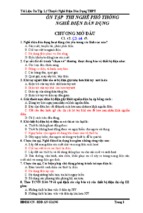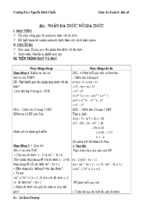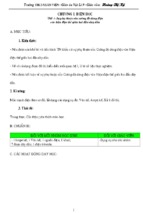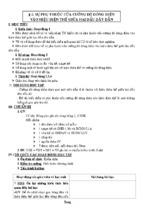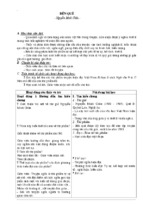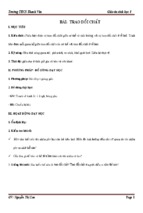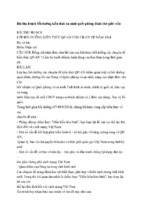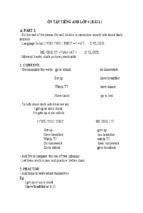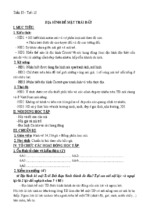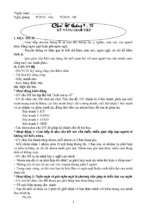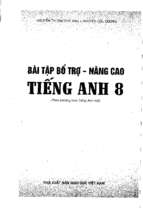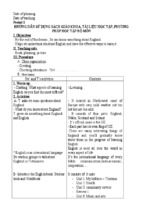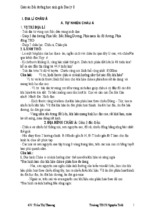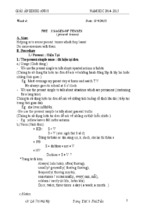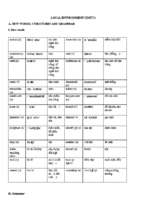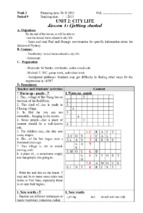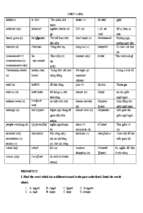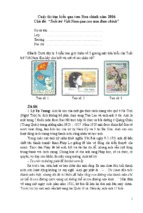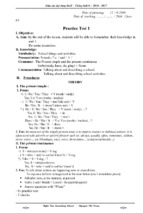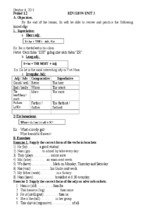English plan 9
Nguyen Van Tuan
d
Date of planning: 07/1/2012
Date of teaching: 10/01/2012 9b c
UNIT 6: THE ENVIRONMENT
Period 37: - Getting started
- Listen and read
I.Aims and Objectives:
Help students read about the work of a group of conservationists and listening for
details to complete.
Vocabulary: - deforestation (n): - Disappointed (by/about/at something) (adj):
- garbage dump (n): - dynamite fishing (n)- spraying pesticides (n) Sewage (n):
- Skill:
+ Target skill : Reading
+ Other skill: Listening, speaking, writing.
- Main teaching point: Grammar: Adj + that clause
- By the end of the lesson, students will know more about the environment problems
and the solutions.
II. Teaching aids.
Textbook, disc, poster….
III. Procedure.
1. Check up.
2. Lead in. Can you tall the class some of the environment polluion in your country?
What are thy? How do you do to prevent them?
3. New lesson.(40minutes)
Steps
Activities
The content of the lesson
* Brainstorming:
Warm-up
- Ask students to think of
(4’ )
the environment problems
Air pollution
dirty street
in their city.
- Get students to go to the
board and write down their
ideas.
Environmental
problems in our
* Possible answers:
I. Vocabulary.
Pre-teach
cityph¸ rõng
vocabulary - The destruction of the - deforestation (n): sù tan
forests.
- garbage dump (n): ®èng r¸c
(5’ )
- Rubbish/ garbage/ trash.
- dynamite fishing (n): viªc ®¸nh b¾t c¸ b»ng thuèc
smote
from
cars, næ
motorbikes…
- spraying pesticides (n): viÖc phun thuèc s©u
- smote from factories.
- disappointed (by/with/at something) (adj): thÊt
* Checking vocabulary: väng, buån rÇu
what and where
- Sewage (n): níc th¶i, níc cèng
Write the words on the
board, put one word on
Spraying
Deforestation
each circle.
pesticides
Set the scene
(1’ )
Text
(14’ )
- Have students repeat the
words in chorus, then rub
out word by word but leave
the circle.
- Go on until all the words
are rubble out.
- Point to each circle and
ask students to repeat
chorally the English words.
- Ask students to go to the
Hien Van Secondary School
Sewage
Disappointed
Dynamite
fishing
II. Text.
1. Matching
* anskeys:
- Picture a: air pollution
School year:2012-2013
71
English plan 9
Do
comprehesio
n
(9’ )
board and write the words
again in their correct
circles.
- Ask students to look at the
six pictures on page 47 in
their text books.
- Ask them to match the
words in the box with the
correct picture.
- Ask students to keep the
books closed.
* Set the scene: Mr. Brown
is talking to some volunteer
conservationists. Guess the
place where they are going
to work
- Give students 1 minute to
guess
- Give feedback
- Ask students to open their
books and read the text on
page 47-48
- Let students check their
prediction
* Answer keys:
- Ask students to match the
names in column a with the
activities in column B
(exercise 2a on page 48)
- Ask them to read the text
again and work in pairs to
match.
- Ask students to work in
pair to answer the question
on page 48 (exercise 2b)
- Let students read the text
again and answer the
questions.
- Give feedback
- Ask students to work in
closed pairs.
Nguyen Van Tuan
- Picture b: spraying pesticides.
- Picture c: garbage dump
- Picture d: water pollution.
- Picture e: deforestation
- Picture f: dynamite fishing
2. Matching
* Answer key:
Group 1: --------------------- f. walk along the shore
Group 2: --------------------- e. check the sand
Group 3: --------------------- b. check among the rock
Mr. Jones: ------------------- a. collects all the bags
and takes them to the dump.
Mrs. Smith -------------- c. Provide the picnic lunch
for everyone.
Mr. Brown--------------- d. give out the bags
3 Questions and answer:
- Who is the speaker?
(The speaker is Mr. Brown)
- Who are the listeners?
(The listeners are (members of) the volunteer
conservationists)
- Where are they?
( They are on the beach)
- What are they going to do?
( They are going to lean the beach)
- What will they achieve if they work hard today?
( If they work hard today, they will make the beach
clean and beautiful again soon)
- Have you ever done anything similar? If yes, what
did you do?
Where did you do it?
(Yes, I have. We clean our school/the pair/street. We
collected the rubbish and take them to the garbage
dump)
- If the pollution continues, what might happen?
(If the pollution continues, the environment around
us won’t be good and it will be harmful to our health,
our life)
III. Grammar.
1.Examples
a. If you can’t find your place, I will help you get
there with this map.
b. I’m disappointed that people have spoiled this
erea.
Forms:
a, Conditional sentence type I. To express a
condition happened in the present or future.
If clause ( present simple) , Main clause( future
siple)
b. Adj + that clause: To express someone’s opinion,
idea and thought about a problem or situation
S + be+ Adj + that clause
4. Summary: Sum upthe main content of the lesson
5. Homework: Write fives sentences uding the conditional sentence typeI and 5 about
Adj + that clause.
Prepair the new lesson U 6 Lesson 2 : Speak
New target
items
(7’ )
Hien Van Secondary School
School year:2012-2013
72
English plan 9
Nguyen Van Tuan
*Self – evaluation:
………………………………………………………………………………………………
………………………………………………………………………………………………
………………………………………………………………………………………………
………………………………………………………………………………………………
Date of planning: 10/1/2012
Date of teaching: 13/01/2012 9b c
d
UNIT 6: THE EMVIRONMENT
Periods 38: - Speak
I.Aims and Objectives:
Help students Practice speaking (to persuade people to protect the environment)
Vocabulary: - Prevent (v): - Reduce (v): - wrap (v): bao bäc (mine)
- fauce (n):- leaf (n): --leaves (pl.)
- Skill:
+ Target skill : Speaking
+ Other skill: Listening, Reading, writing.
- Main teaching point: Grammar: Expression to persuade the other
- By the end of the lesson, students will be able to persuade their friends to protect
environment
II. Teaching aids.
Textbook, disc, poster.
III. Procedure.
1. Check up. Have two ss do exercise 1 page 54
2. Lead in. Are there any pollution in your village? How do you do with this matter? How
do you persuade other to prevent pollution?
3. New lesson.(40minutes)
Steps
Prespeaking
(7’ )
Whlespeaking
Activities
* Jumble words:
- Divide the class into two
team. Students from to
teams go to the board and
write the correct words.
- The team which writes
more correct words fists
wins the game.
* Checking vocabulary:
- Put the new words all
over the board, each word
in a circle.
- Call two students or two
teams (6 students for each
team) to the from of the
class. Ask them to stand at
an equal distance from the
blackboard.
- Teacher calls out some of
the new words on
Vietnamese in a loud
voice; the two students
must run forward and slap
Hien Van Secondary School
The content of the lesson
1. uadepse
=
Persuade
2. beaargg
=
Garbage
3. roderpvo
=
Provide
4. lupotilon
=
Pollution
5. duproce
=
Produce
6.paispoidednt =
Disappointed
- Prevent (v): ng¨n chÆn , phßng ngõa
- Reduce (v): gi¶m , lµm gi¶m
- wrap (v): bao bäc, gãi
- fauce (n): c¸i vßi níc
- leaf (n): --leaves (pl.) l¸ c©y
Prevent
Reduce
Wrap
Leaf
II. Speaking
Faucet
I. Preteach
vocabulary
Garbage
bin
1. Expression using to presuade the other
School year:2012-2013
73
English plan 9
(24’ )
Postspeaking
(9’ )
the word on the
blackboard. The one who
slap the right word first is
the winner.
- Ask 2 more students to
come forward, etc until all
the words are slapped.
- Ask students to complete
the expressions in column
A by using one of the lines
in column B (page 49) then
compare with their
partners.
- Have students match the
lines in column B with an
expression in column A so
that they have sentences of
persuasion
* Use: Express persuasion
III. Practice speaking
- Each student’s calls out
one of their sentences
unstill all sentences are
finished.
IV. Questionnaire
- Let students work in pair
to answer to the questions
in the questionnaire.
- Give feedback, teacher
can write some possible
answer on the board so that
weak students can follow.
- Ask students to practice
asking and answering.
- Ask the whole class to
work in pairs.
* Possible answer:
* Exhibition:
- Divide the class into 4
groups, each group has a
secretary. Ask them to
discuss the question:
“What you do to protect
the environment”.
- The students in groups
have opinions, the
secretary writes down.
- Gets students to use the
ideas in exercise 3a, b.
- After finishing, the
students stick the 4 posters
on the wall. They can go
around the class and read 4
posters.
- Give feedback.
Nguyen Van Tuan
I think you
should
Won’t you
It would be better
+ INFINITIVE
if you
Can I persuade
you to
Why don’t you
Why not
What / how about + V-ing ?
2. Example:
S1: I think you should use banana leaves to wrap food.
S2: Won’t you use banana leaves to wrap food?
S3: Why don’t you turn off the lights before going to
bed?
S4: It would be better if you go to school or go to work
by bike.
S5: Can I persuade you to check all the faucets before
going out?
S6: Why not put garbage bins around the school yard?
S7: I think you should use public buses instead of
motorbike.
S8: What about using public buses instead of
motorbike?
S9: ……………………
Questionaire: Protecting th environment
1. How can we save paper?
* I think you should recycle used paper, newspapers
* Why don’t you use banana leaves for wrapping?
* Won’t you write on both sides of plastic bags?
2. How can we use fever plastic bags?
* How about cleaning and reusing them?
* Why not use paper bags instead of plastic bags?
3. How can we reduce water pollution?
* It would be better if you don’t throw waster and
garbage into streams, lakes or rivers and even ocean.
4. How can we prevent littering?
* I think we should put garbage bins around the school
yard.
* Why don’t you throw all garbage in waster bins?
5. How can we reduce air pollution?
* Can I persuade you to go to school by bike?
* Why not use private vehicles less?
6. How can we reduce the amount of garbage we
produce?
* Won’t you try to reuse and recycle things?
4. Summary: Sum up the expression using to persuade the other
Hien Van Secondary School
School year:2012-2013
74
English plan 9
Nguyen Van Tuan
5. Homework: Write a passage about 100 words to persuade the other to protect the
environment
*Self – evaluation:
………………………………………………………………………………………………
………………………………………………………………………………………………
………………………………………………………………………………………………
……………………………………………………………………………………
d
Date of planning: 14/1/2012
Date of teaching: 17/01/2012 9b c
UNIT 6: THE ENVIRONMENT
Period 39: Listen
I.Aims and Objectives:
- Helpinng students listen to the report on how our oceans are polluted .Then complete the
notes.
Developing the listening skill.
- Vocabulary: to pump, to drop, raw sewage, oil, a vessel, to wash,
- Skill:
+ Target skill : Listening
+ Other skill:, Reading, speaking, writing.
- Main teaching point: Grammar: Listen for specific information
- By the end of the lesson , students will be able to listen to the report on how our oceans are
polluted .Then complete the notes.
II. Teaching aids.
Textbook, disc, poster.
III. Procedure.
1 Check up. Have two students to read their passage before the class
2 Lead in. Have your heard about the pollution in the ocean? How are Oceans polluted?
Today we ‘ll listen to the report and find out how tey are polluted.
3 New lesson.(40minutes)
Steps
Activities
The content of the lesson
Warm up: have ss 5 minutes I. Vocabulary.
PreListening to find out how the
to pump, b¬m (níc)
environment is polluted and
(20’ )
to drop, th¶ ,nÐm
how to protect it from
pollution.
raw sewage, níc th¶i sèng( cha qua sö lÝ)
Present some new
oil, dÇu má
vocabulary.
Examle
a vessel, tµu chë dÇu
Mime
to wash, röa
Translation
Realia
II. Listening
1. Guessing.(Fill in the blanhks)
While-
- Have students work in pairs
to foind out how our oceans
are polluted.
Hien Van Secondary School
School year:2012-2013
75
English plan 9
Listening
(10’ )
PostListening
(10’ )
Nguyen Van Tuan
- Ask some to speak out
before the class
- TWC and ive feedback
- Have students listen to the
tape twice to check their
guess
- Listen again to check the
answers
- Work in pairs to discuss to
find out how to solve this
matter.
- TWc and check.
How the ocean is polluted
Firstly: raw sewagew is pumped directly into
the sea
Scendly: ___(1)__dropped into the sea
Thirly: oil spills______(2)________
Next: __________(3)_______Finally: _______(4)______________
Keys* Listening:
* Answer keys:
1. Garbage is dumped into the ocean.
2. Oil spills come from ships at sea 3.Waste
materials come from factories
4. Oil is washed from land.
4. Summary: Sum up the main way to pollute the oceans
5. Homework: Write a passage about 100 words about the sollution of oceans p[olluted.
Prepair the new lesson Unit 6 Lesson 4 Read.
*Self – evaluation:
………………………………………………………………………………………………
………………………………………………………………………………………………
………………………………………………………………………………………………
………………………………………………………………………………………………
d
Date of planning: 15/1/2012
Date of teaching: 18/01/2012 9b c
UNIT 6: THE ENVIRONMENT
Period 40: Read
I.Aims and Objectives:
- Helpinng students read a poem about the environment. Developing the reading skill.
Vocabulary: - Junk yard (n): - treasure (n): - Hedge (n): - nonsense (n): - Foam (n):
- Skill:
+ Target skill : Reading
+ Other skill:, Listening, speaking, writing.
- Main teaching point: read for details
- By the end of the lesson, students will be to understand a poem about the environment
II. Teaching aids.
Textbook, disc, poster.
III. Procedure.
1. Check up. Have two students to read their passage before the class
2. Lead in. Have your evar read a poem about the environment? Can you read now? Today
we ‘ll red a poem about the environment.
3. New lesson.(40minutes)
Stage
Activities
The content of the lesson
* Chatting:
I. Vocabulary
- Ask students some questions
- Junk yard (n): b·i phÕ th¶i
about poetry
- treasure (n): kho b¸u
+ Do you like poetry?
- Hedge (n) hµng rµo
PreHien Van Secondary School
School year:2012-2013
76
English plan 9
Nguyen Van Tuan
reading
(10’ )
+ Which poetry do you like best? - nonsense (n): ®iÒu v« nghÜa, d¹i dét
+ Name some poems that are your - Foam (n): bät
favorite?
+ Do you think it is easy
II. Read.
understand a poem?
1. Pre questions
+ Have you ever read an English
Question:
poem? Do you understand it? Do
a) Who are the people in the poem?
you like it?
b) Where are they?
* Checking vocabulary: Rub out
* Answer key:
and Remember
a) The mother and her son.
- Get students to copy the work in b) They are in the park/woods
their books.
2. Matching
- Ask students to repeat the words
A
B
chorally.
1. junk yard a. a row of things
- Rub out the words one at a time.
2. end up
forming a fence.
Each time you rub out an English
3. treasure b. people
word, point to the Vietnamese
4. foam
c. a piece of land full
translation and ask “what’s this in
5. stream
of rubbish.
English?” (the whole class answer 6. hedge
While
d. a flow of water
chorally)
reading
7. folk
e. mass of bubbles of
- When all the English words are
(20’ )
air gas
rubbed out, go through the
f. valuable or
Vietnamese list and get students to
precious things
call out the English equivalent.
g. reaches of state of.
- If there’s time; get students to
* Answer key:
come to the board and write the
1-c, 2-g, 3-f, 4-e, 5-d, 6-a, 7-b
English words again.
3. Comprehension questions
- Give students two questions and * Answer key:
ask them to answer before reading 1. According to the mother, what will happen
the poem.
of the pollution goes on?
* Set the scene:
- If the pollution goes on, the world will end
Two people are going on the
up like a second hand junk yard.
picnic. They are talking about the 2. Who does the mother think pollute the
pollution.
environment?
- Have students work impairs to
- The mother thinks other folk pollute (are
guess the answers.
responsible for the pollution of) the
- Give feeback
environment but not her or her son.
- Have students read the poem and 3. What will happen to the boy if he keeps on
check their answers.
asking his mother such questions?
- Ask students to practice asking
- His mother will talk him home right away
and answering the questions in
4. Do you think the boy’s question is silly
pairs.
(line 9-10)? Why not?
- Have students practice guessing - No. Because he is right; if he throws the
the meaning if the words by
bottles that will be polluting the woods.
matching each word in column A 5. What does the poet want us to learn about
with an appropriate explanation in keeping the environment unpolluted?
column B.
- The poet wants us to learn that everyone is
Post
Show
5
questions
(from
1-5)
on
responsible
for keeping the environment from
reading
page 51.
pollution.
- Get students to work in pairs to
(10’ )
answer the questions.
* Discussion:
- Divide the class into four groups
- Have students discuss the
question:
“What could you do in your house
to minimize pollution?”
4. Summary: Sum up the main content of the poem.
Hien Van Secondary School
School year:2012-2013
77
English plan 9
Nguyen Van Tuan
5. Home work- Ask students to write 5 things that they have to do to keep the environment
unpolluted.
- Prepair the new lesson Unit 6 lesson 5 Write
*Self – evaluation:
…………………………………………………………………………………………………
…………………………………………………………………………………………………
…………………………………………………………………………………………………
…………………………………………………………………………………………………
Date of planning: 28/1/2012
Date of teaching: 31/01/2012 9b c d
UNIT 6: THE ENVIRONMENT
Period 41: Write
I.Aims and Objectives:
- Helpinng students Write a letter of complaint. Developing the writing skill.
- Vocabulary: - complain (v): complication (n)- resolution (n)- float (v):- prohibit (v):
- Skill:
+ Target skill : Writing
+ Other skill:, Reading, speaking,. Listening
- Main teaching point: Write a letter
- By the end of the lesson, students will be able to write a complaint letter..
II. Teaching aids.
Textbook, disc, poster.
III. Procedure.
1. Check up. Have 5 students to write things to protect the environment
2. Lead in. Have your write a letter? How did you write? Today we ‘ll deal with this
matter.
3. New lesson.(40minutes)
Stages
Steps/Activities
The content of the lesson
* Categories:
T
a
b
c
d
- Ask students to find out the
Writes
verbs beginning with the
:
add
borrow cut
drive
letter that teacher gives.
S
t
u
v
Pre writing - Divide the class into groups. Writes s
- Give four, five letters at the
:
(6’ )
same time, students are to
T
study talk
use
value
find out four/five verbs
Writes
beginning with four/five
:
m
n
o
p
letters given.
S
- The team which finish first
Writes meet nod
open put
gets one mark
:
Example:
I. Pre-teach vocabulary
* Checking vocabulary: rub
- complain (v): phµn nµn
out and Remember
complication (n): ®iÒu g©y r¾c rèi
- Get students to copy the
- resolution (n):¸nù quyÕt t©m
words in their books and then - float (v): tr«I næi bång bÒnh
ask them to close their books. - prohibit (v): ng¨n c¶n ng¨n cÊm
Rub out the new words one at II. Writing.
a time. Each time you rub out 1. Ordering
the word in English, point to a. Action: talks about future action
the Vietnamese translation
b. Situation: states the reason for writing.
and ask “What’s this in
c. Politeness: ends the letter politely
English?” When all the
d. Complication: mention the problem
English words are rubble out, e. Resolution: makes a suggestion.
go thought the Vietnamese
* Answer key:
list and get students to call
1-b
Hien Van Secondary School
School year:2012-2013
78
English plan 9
Nguyen Van Tuan
out the English words. (If
there’s time, get students to
come to the board and write
the English words again.)
- Ask them to keep their
books closed
- Provide students five section
of a complaint letter (with
their definitions) in random
order.
- Get them to put the sections
in a correct order.
- Have students read the letter
on page 52
* Set the scene:
Mr. Nhat wrote a letter to the
director of L & P Company in
Ho Chi Minh City. The five
sections of the letter are not in
the right order. Label each
section with the appropriate
letter: S, C, R, A or P
- Ask students to work in
pairs.
- - Give feedback: call on a
student to read aloud the
letter (in the correct order).
Teacher gives ideas if
necessary.
* Answer key:
Dear Sir/Madam
- Let students read the
production 6b on page 53.
- Ask some questions to make
sure the students know what
there have to write.
- Ask students to write the
letter individually.
- Get students to share with
their partners and correct if
possible
2-d
3-e
4-a
5-c
2. Reading and matching
R I would suggest your company to tell
your drives to clear up all the trash
on the ground before leaving.
S I am writing to you about the short
stop of your trucks around my house
on their way to the North
A I look forward to hearing from you
and seeing good response from your
company
C When the trucks of your company
have a short break on the streets
around my house, the drives have
left lots of garbage on the ground
after their refreshment. When the
trucks leave the place, the ground is
covered with trash and few minutes
later there is smell and flies.
P Sincerely,
Tran Vu Nhat
While
3. Questions:
writing
a. What do people do in the lake behind your house
these days?
(26’ )
( They begin to catch fish)
b. What makes you worried?
( They use electricity to catch fish)
c. To whom do you write the letter to?
(We write to the head of the local authorities)
d. What suggestion do you want to make?
(We suggest the local authorities should prohibit
and fine heavily any one using electricity to catch
fish).
Post
e. Any future plant you want to make?
writing
( We look forward to seeing the protection of
(8’ )
environment from the local authorities)
4. Sample:
Dear Mr. President.
I am writing to you about the catching of fish of
- Move around the class and
many people in the lake behind my house.
help students
I am very worried because they use electricity to
- Call on some students to
catch fish. After a short time, they leave the lake; a
read aloud their letter.
lot of small fish die and float on the water surface.
- Give feedback, correct some I would suggest the local authorities should prohibit
letters before the class. T can and fine heavily anyone using this way of catching
write the mistakes (spelling;
fish. I look forward to hearing from you and seeing
grammar…) on the board.
the protection of environment from the local
authorities.
Sincerely,
4. Summary: Sum up th five sections of the complaint letter
5. Homework- Ask students to write their letter in their notebooks.
- Prepair the new lesson unit 6 lesson 6 Language focus
*Self – evaluation:
…………………………………………………………………………………………………
…………………………………………………………………………………………………
Hien Van Secondary School
School year:2012-2013
79
English plan 9
Nguyen Van Tuan
…………………………………………………………………………………………………
…………………………………………………………………………………………………
Date of planning: 30/1/2012
Date of teaching: 1/02/2012 9b c
UNIT 6: THE ENVIROMENT
Period 42: Language focus
I.Aims and Objectives:
- Helping students further practice in Adjectives and adverbs , Adverbs clauses of reason,
Adjective + that clause and Conditional sentences type 1
- Vocabulary: Revised
- Skill:
+ Target skill : Writing.
+ Other skill:, Reading, speaking, Listening
- Main teaching point: Adjective + that clause and Conditional sentences type 1
- - By the end of the lesson, sts will be able to use adjectives and adverbs to make sentences
adjective + that clause
II. Teaching aids.
Textbook, disc, poster.
III. Procedure.
1 Check up. Have two students to read their letters before the class
2 New lesson.(40minutes)
Steps
Activities
The content of the lesson
Practice -Prepare twelve cards with
I. Adjectives and adverbs
1
numbers on one side and the
Adj Adv
(10’) adjectives (6 cards), adverbs (6)
Adj + ly Adv
on the other side.
Adj _y i + ly = Adv
- Make sure the adjectives are
mixed up.
Irregular.
- Stick the cards on the board so
Good well
students can only see the number.
Early early
- Divide the students into two
teams and ask them to choose two
Hard hard
numbers.
Fast fast
- Turn the cards over and see if
Late late
they match.
Adjective + that clause
Ba: Dad! I got mark 9 on my text
Father: That’s wonderful. I’m
Hien Van Secondary School
School year:2012-2013
80
English plan 9
Nguyen Van Tuan
pleased that you are working hard.
Practice
2
Eg: happy – happily, give them
(10’) on mark. If not, tune the cards
obvert again and ask the next
team to choose numbers.
- Continue until all the cards are
finished.
adjective + that clause
To express some one thought,
feeling, emotion, about a problem
or a situation.
Ex: Complete sentences.
1.That’s wonderful. I’m..(pleased
/work hard)
EXERCISE 1:
2. He’s………….(excited/go/Dalat)
* From the result of the game, sts 3. We…………(sorry/break/bike)
give the formation of adv of
4. They…..9disappointed/not phone)
manner.
Adj + LY – Adverb of manner 5. She ……(amazed/win the first
- T. asks sts to do the exercise (p
prize)
51-1) in groups.
II. Adverbs clauses of reason,
- T gives the answer keys.
Example: Ba is tired
- T. asks sts to tell the positions of because/since/as he stayed up late at
adj – adv
night.
EXERCISE 2:
Adverb clauses reason
* Revision of adverb clauses of
- Begin with Because/Since /As to
reason with because, since, as:
point out the reason why some one
Give two sentences and ask
or thing happened
students to combine them into
Exercise. Join the pairs of the
one.
sentences together. Use
Example: a) Nam goes to school
because/since/as
late.
1. I have a broken leg. I fell over
b) He missed the bus
while I was playing basketball.
2. She’s going to be late for
Nam goes to school late
school. The bus is late.
because he missed.
3. I broke the cup. I was careless.
* Ask students to use other words
4. I want to go home. I feel sick.
for BECAUSE
Practice ANSWER: SINCE or AS
5. Nga is hungry. She hasn’t
3
eaten all day.
- Have students to language Focus
(10’) 2 exercise on page 54-55
III. Conditional sentences type 1
.
- Let students work in park and
join the pair of sentences together If we pollute the water, we will have
no fresh water to use.
using, Because, Since or As.
If + main clause, subordinate
- T: call on some students to read
clause
aloud their sentences.
(Simple present tense) (will /
- T: correct the sentences.
infinitive)
Give feedback.
* Matching:( Page 56 Exercise 4)
4. Summary: Sum up the language items
5. Homework: - Write – it – up
- Prepare the new lesson unit 7 lesson 1
*Self – evaluation:
Hien Van Secondary School
School year:2012-2013
81
English plan 9
Nguyen Van Tuan
Date of planning: 4/2/2012
Date of teaching: 7/02/2011 9b c
UNIT 7: SAVING ENERGY
Period 43: Lesson 1: Getting started + Listen and read
I. Objectives:
- Help students understand the content of the text and know how to say energy
and give and respond to suggestions.
- Vocabulary: - the water bill, a plumber, a crack, a dripping faucet, to turn off:
- Skill:
+ Target skill : Reading
+ Other skill:, , speaking,. Listening Writing
- Main teaching point: make suggestions
- By the end of the lesson, students will be able to understand the dialogue and know how to
make suggestions
II. Teaching aids.
Textbook, disc, poster.
III. Procedure.
1. Check up. Have 5 students to write things to protect the environment
2. Lead in. Have your write a letter? How did you write? Today we ‘ll deal with this
matter.
3. New lesson.(40minutes)
Steps
Activities
The content of the lesson
Warm-up - Sing the song “Turn on – Turn
I. Vocabulary.
5’
off” (based on “Stand up – Sit
- the water bill, ho¸ ®¬n iÒn níc
down”)
a plumber, thî söa èng níc
- Teacher shows the pictures and
a crack, chç rß rØ
Pre-teach asks Ss to tell about these 2 rooms: a dripping faucet, vßi níc rØ
5’
+ Is there any one in the bathto turn off: t¾t, ng¾t
room/ living-room?
II. Dialogue
Set the
+ Is the TV on?
a. True or false.
scene
+ Who is watching TV/ listening
1T
2T 3F
2’
to the radio?
+ Who is using water?
4F
5T
+ How about the lights/ the water
3=> Mrs Ha has not checked……
Dialogue in the bath-room?
4=> Mrs Mi suggests…….a plumber…..
10’
- SS answer
b. Answer.
- Teachers says: Wasting energy
+ What should we do?
1/ What is Mrs. Ha worried about?
+ Should we turn the TV off then
- Her most recent water bill
we go out of the room?
2/ Why is Mrs. Ha worried?
+ What should we to do save
Because It’s enormous
energy?
- T introduces section “listen and
3/ Which sentences tell you that Mrs. Mi
read”
advises Mrs. Ha to save money?
- T explains a few new words that
Get a plumber to make sure that there
Ss need for the dialogue.
are no cracks n the pipes
+ Enormous (adj): very big
+ Turn on (phr.v) # Turn off (phr.v) 4/ What does Mrs. Mi advise Mrs. Ha to
Waste (v) # Save (v)
do?
- Ss listen to tape (books closed)
Taking shower
- Ss listen to tape (books opened)
- Ss practice the dialogue in pairs.
* True- False statements (group
work)
- Ss reread the dialogue & do the
Hien Van Secondary School
School year:2012-2013
82
English plan 9
Nguyen Van Tuan
exercise
- Ss exchange their works with a
parser
Comprehen - Feedback: T asks, Ss answer
For the False statements, T asks Ss
sion
to give the correct ones.
10’
* Comprehension:
- Ss work in pair to answer the
Grammar question:
- Fill in the blanks with correct
8’
words (group work)
- Free practice: about saving
energy (pairs)
Write 5 sentences about saving
energy
III.Grammar.
1. I suggest taking shower.
2. Remember to turn off the faucets
= > Making suggestions
S + suggest + V ing.
= > Phrase verbs
V + adv
prep
To turn off
To turn on
To look after
4. Summary: Sum up the new target item
5. Homework: Do exercise 1& 2 in the work book
Learn by heart Vocab
Prepare the new lesson Unit 7 Lesson 2
*Self – evaluation:
………………………………………………………………………………………………
………………………………………………………………………………………………
………………………………………………………………………………………………
………………………………………………………………………………………………
Date of planning: 7/2/2012
Date of teaching: 10/02/2011 9b c
UNIT 7: SAVING ENERGY
Period 44: Lesson 2: SPEAK
I.Aims and Objectives:
- Helpinng students make suggestions about how to save energy
- Vocabulary: instead of, to turn down, to hang, to turn off,
- Skill:
+ Target skill : speaking,
+ Other skill:, Reading,. Listening & Writing
- Main teaching point: Make suggestions
- By the end of the lesson, students will be able to make suggestions and responses about how
to save energy
II. Teaching aids.
Textbook, disc, poster….
III. Procedure.
1. Check up. Have 5 students to write things to protect the environment
2. Lead in. Have your write a letter? How did you write? Today we ‘ll deal with this
matter.
3. New lesson.(40minutes)
Steps
Techniques and Content
The content of the lesson
Hien Van Secondary School
School year:2012-2013
83
English plan 9
Prespeakin
g
6’
Whilespeakin
g
26’
Postspeakin
g
8’
Nguyen Van Tuan
- Supposing a situation: It is in the morning and
the weather is cool. All the fans in the classroom
are on. Ask students what would do to save
energy in the case Giving suggestions.
- Asking students to give on the suggestions
Mrs. Mi gives to Mr. Ha in the previous lesson.
I . Vocabulary.
instead of, thay v×
to turn down, gi¶m, vÆn nhá
to hang, treo
to turn off, t¾t
II.
Speaking
- Reminds Sts of the structures they have learnt
that are used to give suggestions. (What
about…/ Why don’t we…/ Let’s…/)
- Asking students to open the textbooks. Page
58, part 2 – Speak and to add some mores
structures, paying more attention on the two
structures using “should”.
- Asking students how to response a suggestion
(Agree and Disagree)
+ Agree: OK/ That’s a good idea/All right
+ Disagree: No. I don’t want to/ I prefer to/
Let’s …
- Conducting repetition these structures among
the students.
- Asking some pair to perform before the class
and checking (pronunciation, grammar)
* Predicting the activities: asking students to
predict the activities for each pictures that are
for saying energy (more than one activity for
each picture is fine_ = page 59
- Checking before the class
* Pair work: Giving suggestions and responses
out if these activities.
- Checking before the class.
* Group work: Students workings in groups of
4, playing the roles of A, B, C and D
- Some groups forming before the class.
- Explaining the task of this activity.
- Students working in groups of 4 again,
working out a similar exchange to save energy
foot their class, using the expressions and ideas
in the previous activities.
Some groups performing the class then
checking.
Suggestion
I suggest + V ing…..
I think we should………
Shall we…..?
Why don’t
we/you……………?
How about + Ving……..?
What about + Ving……..?
Let’s………………
I suggest that we/ you
should……
Response
Ok!
That’s a good idea
All right.
No, I don’t want to.
I prefer to…….
Let’s………….
Example:
A: Why don’t you turn off
the faucet after use?
B: All right.
4. Summary: Sum up the expression to make suggestion
5. Homework:- Asking students to compare the two sources of power: “solar energy and
nuclear energy”, which is better, more convenient, easier to exploit, etc.
- Prepare the new lesson Unit 7 lesson 3
*Self – evaluation:
…………………………………………………………………………………………………
Hien Van Secondary School
School year:2012-2013
84
English plan 9
Nguyen Van Tuan
…………………………………………………………………………………………………
…………………………………………………………………………………………………
………………………………………………………………………………………………….
Hien Van Secondary School
School year:2012-2013
85
English plan 9
Date of planning: 1/2/2013
Date of teaching: 4/02/2013 - 9A
Hien Van Secondary School
Nguyen Van Tuan
05/02-9B
School year:2012-2013
86
English plan 9
Nguyen Van Tuan
UNIT 7: SAYING ENERGY
Period 45:Lesson 3: -Listen
I.Aims and Objectives:
- Helping students listen to the news on solar energy
- Vocabulary: solar energy, nuclear power, to provide, to heat, a solar panel
- Skill:
+ Target skill : Listening
+ Other skill:, Reading, speaking,. Writing
- Main teaching point: Listen for details
- By the end of the lesson, students will be able to know more about solar energy by listening.
II. Teaching aids.
Textbook, disc, poster….
III. Procedure.
1. Check up. Have 5 students to write things to protect the environment
2. Lead in. Have your write a letter? How did you write? Today we ‘ll deal with this
matter.
3. New lesson.(40minutes)
Stage
Steps/ Activities
The content of the lesson
* Information transmitting:
PreI. Vocabulary.
solar energy, n¨ng lîng mÆt trêi
listening - Divide class into two teams
- Choose six volunteers from
nuclear power,n¨ng lîng h¹t nh©n
10’
each team.
to provide, cung cÊp
- The volunteers stand in two
to heat, lµm nãng
lines. The teacher shows the
a solar panel tÊm pin n¨ng lîng mÆt trêi
first student in each line a
II. Listening.
sentence.
A. True – False statements prediction
- The first students whisper the 1. Solar energy can be cheap and clean
whole sentences to the second
2. Most of our electricity now comes from
students in his / her line.
nuclear power.
- The second student whispers to 3. The solar energy that gets to the Earth
the third and so on.
cannot provide enough power for the world’s
- The last students shout out the population.
sentence, (or write it on the
4. Solar energy can be used on cloudy days.
board) if it is the same as the
5. All buildings in Sweden will be heated by
sentence teacher shows, that
solar energy in 2050
team wins the match.
1. T
* Sentence 1: I suggest
2. F
Most of our electricity
collecting waste paper.
comes from the use of
* Sentences 2: I suggest
coal, gas, oil or nuclear
practicing English every day.
power.
- Call on two students or 2
3.
F
1% of the solar energy that
teams of students to the front of
gets to the Each can
the class.
provide enough power for
- Make sure they stand at an
the world’s population.
equal distance from the board
4.
T
- Call out one word in
5. F
Vietnamese, the 2 students
They will be heated by
solar energy in 2015.
much run forward and slap the
B. Answer keys:
correct word on the board. The
1. The Sun can be an effective source of power
one who slaps first is the
2. Solar energy doesn’t cause pollution
winner.
3. A lot of countries in the world are already
- Continue to ask 2 more
using solar energy
students to come forward.
4. It is possible to store solar energy for a
Go
to
until
students
have
While
number of days.
listening slapped all the words.
5. Solar panels are installed on the roof of a
15’
house to receive the energy from the Sun
- Ask students to look at the
Hien Van Secondary School
School year:2012-2013
87
English plan 9
Nguyen Van Tuan
statements on page 60 (4a)
- Have they work in pairs and
guess which statements are true
and which one are false.
- Get students to correct the
false statement
Postlistening * Answer keys:
15’
- Give feedback
- Have students listen to the tape
again and fill in the gaps. If
students can’t finish, let them
listen once more.
* Write it up:
- Have students write passage
(about 100 words) about solar
energy, using the information in
the two exercises above
6. We can save natural resources by using
solar energy instead of coat, gas and oil
* Sample:
Most of our electricity now comes from coal,
gas, oil, or nuclear power. The sun could
provide this power so many countries are
already using energy. Only one percent of the
solar energy that gets to the Earth can provide
enough power for the work’s population. Solar
energy is a cheap, clean effective source of
power that doesn’t cause pollution or waste
natural resources.
There’s an advanced solar energy program in
Sweden. It is said that by the year of 2015, all
building in Sweden will be heated by solar
energy and cards will use solar power too.
We hope that there is such a program in
Vietnam. We can save natural resources such
as coal, oil, gas… by using solar energy. And
every house hold in Vietnam has hot water in
Winter without paying money.
4. Summary: Sum up the information about solar energy,
5. Homework: write – it – up
Prepare the new lesson Unit 7 Lesson 4.
* Tape transcript:
“Are you using looking for cheep, clean, effective source power that doesn’t cause pollution or
waste natural resources? Look no further than solar energy from our sun. At present, most of
our electricity comes from the use of coal and gas, oil or nuclear power. This power could be
provide by the sun. One percent of the solar energy that reaches the Earth is enough to provide
power for the total population.
Many countries are already using solar energy. Solar panels are placed on the roof of a house
and the Sun’s energy is used to heat water. The energy can be stored for a number of days, so
on cloudy days you can use solar energy too.
Sweden has an advanced solar energy program. There, all buildings will be heated by solar
energy and cars will use solar power instead of gas by the year 2015”
*Self – evaluation:
…………………………………………………………………………………………………
…………………………………………………………………………………………………
…………………………………………………………………………………………………
………………………………………………………………………………………………….
Date of planning: 1/2/2013
Date of teaching: 5/02/2013 - 9A
19/02-9B
UNIT 7: SAVING ENERGY
Period 46 ; Lesson 4 : Read
I.Aims and Objectives:
- Helping students read the text about energy saving
- Vocabulary: a consumer, a label, a bulb, efficient(adj), (to)conserve, a scheme
- Skill:
+ Target skill : Reading
+ Other skill:, , speaking,. Listening Writing
- Main teaching point: Read for details
- By the end of the lesson, students will be able to know how European countries save
energy.
II. Teaching aids.
Hien Van Secondary School
School year:2012-2013
88
English plan 9
Nguyen Van Tuan
Textbook, disc, poster.
III. Procedure.
1. Check up. Have 5 students to write things to save energy.
2. Lead in. Have you ever do things to save energy ? How did you do? Today we ‘ll deal
with this matter.
3. New lesson.(40minutes)
Steps
Activities
The content of the lesson
Warm
up
Look at the picture and answer the
questions
Wordquiz
SAVING ENERGY
I Vocabulary.
a consumer: kh¸ch hµng(picture)
T elicits vocab
a label: nhãn mác(ex)
Sts read and copy
a bulb: bãng ®Ìn(realia)
a scheme =a plan: kế hoạch(syn)
efficient(adj) hiÖu suÊt cao(trans)
to conserve: bảo tồn(situation)
II. Reading.
Pre1.True/False Statements
readin T sets the scene.
a.Electricity ,gas, and water are luxuries
g (8’ ) T asks sts to read and guess T/F .
in Western countries .
T writes sts’ prediction.
T asks sts to read and check their
b. Western consumers are interested in
prediction.
the products that will work effectively
and save money .
c.Using an ordinary can help them spend
less on lighting.
d,The labeling scheme helps the
consumers use household appliances
efficiently.
While- T gives key
e,We’ll save money and conserve the
readin a-F;b-T;c-F;d-T;e-T
Earth’s resources if we save energy.
g (20’ ) - Have some sts read the text loudly
2. Answer.
- Ask sts to choose the best summary
=>1 . They are interested in products that
of the passage
will not only work effectively, but also
- Have sts work in pairs to find out the save money.
answers of questions page 61 (text
=>2. We can replace an ordinary 100book)
watt bulb with an energy-saving bulb.
- Ask sts to make questions and answer => 3. She will only pay US$ 2 for
give feedback
lighting.
=> 4. It tells the consumers how much
energy efficiency each model has.
=> 5. Because we can conserve the
Earth’s resources.
3. Which is the best summary of the
passage.
Post- - Ask sts to work in groups, discussing => 3. North America and European
readin the ways to spend less on lighting then countries are interested in saving money
g (12’ ) write these ideas on the poster.
and natural resources.
- Have sts exchange posters and choose 4.Discussion:
the best poster
What should (not) we do to save
electricity?
Hien Van Secondary School
School year:2012-2013
89
English plan 9
4.
5.
-
Nguyen Van Tuan
Summary: Sum up how North American and European countries to save energy.
Homework: - Write 5 sentences on how to save electricity
Prepare the new lesson Unit 7 Lesson 5 Write.
*Self – evaluation:
……………………………………………………………………………………………
……………………………………………………………………………………………
……………………………………………………………………………………………
……………………………………………………………………………………………
Date of planning: 15/2/2013
Date of teaching: 18/02/2013 - 9A
22/02-9B
UNIT 7: SAVING ENERGY
Period 47: Lesson 5 Write
I.Aims and Objectives:
- Helpinng students Write a speech. Developing the writing skill.
- Vocabulary: - a speech, to sum up, easy-to-understand, the solid garbage, separate(adj), to
draft
- Skills:
+ Target skill : Writing
+ Other skill:, Reading, speaking,. Listening
- Main teaching point: Write a speech
- By the end of the lesson, students will be able to write a speech
II. Teaching aids.
Textbook, disc, poster.
III. Procedure.
1. Check up. Have 5 students to write things to write a composition I Vietnamese
2. Lead in. Do you have a speech before the class? How did you do? Today we ‘ll deal
with this matter
Steps
Teacher’ s activities
The content of the lesson
Student’ s activities
Hien Van Secondary School
School year:2012-2013
90
- Xem thêm -

